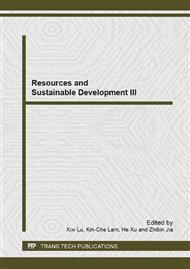p.618
p.622
p.626
p.630
p.636
p.642
p.646
p.650
p.657
The Effect of Stress-Sensitivity on Gas well Production in Volcanic Gas Reservoirs
Abstract:
During the volcanic gas reservoirs development, stress-sensitivity will result in permeability decline with formation pressure drop, lowering gas production and affecting the whole gas reservoirs development program. On the basis of the stress-sensitivity experiments on volcanic rocks, the characteristic of stress-sensitivity in volcanic reservoirs is analyzed. On this basis, this paper studies the prediction method of gas well productivity in volcanic gas reservoirs with stress-sensitivity, and establishes the mathematical model of constant pressure production in volcanic gas reservoirs. The results show that the permeability of volcanic rocks has an exponential relationship with effective stress. The stronger the stress-sensitivity is, the more the gas well productivity losses under the same conditions. And the reservoir stress-sensitivity will increase the degree of gas well unsteady production decline.
Info:
Periodical:
Pages:
636-641
Citation:
Online since:
June 2014
Authors:
Price:
Сopyright:
© 2014 Trans Tech Publications Ltd. All Rights Reserved
Share:
Citation:


